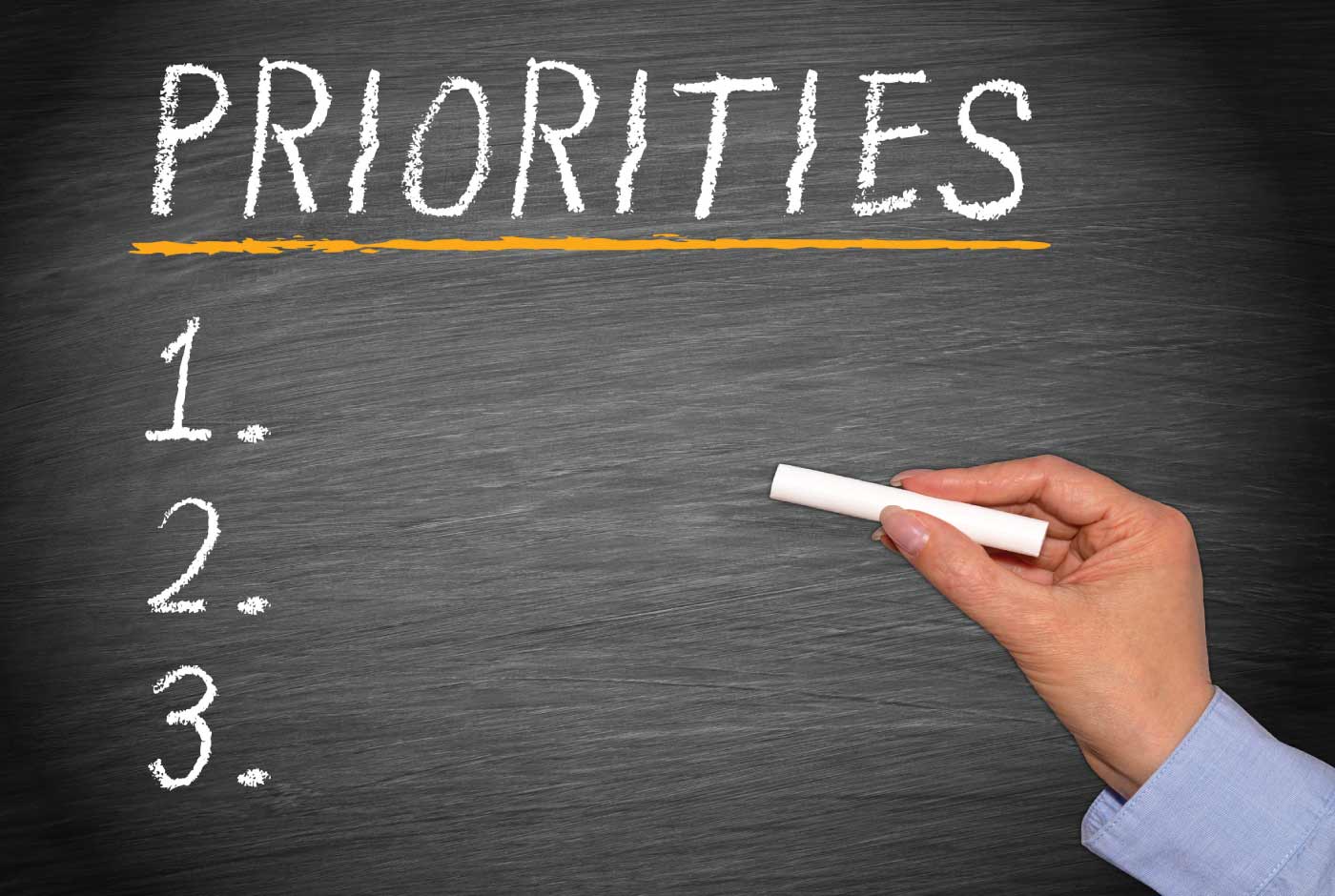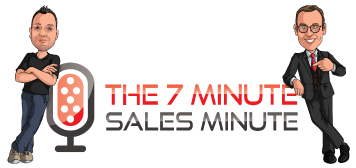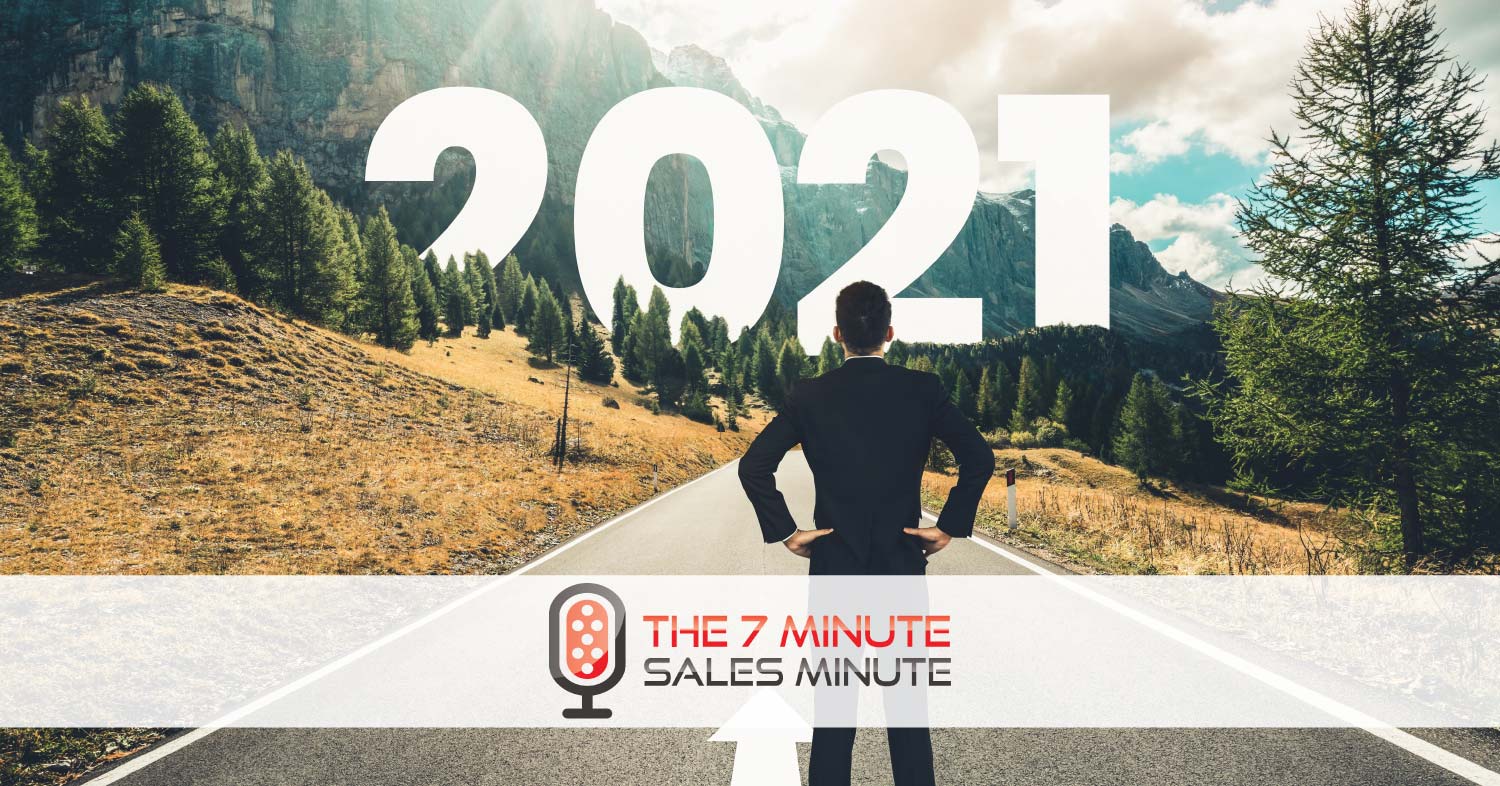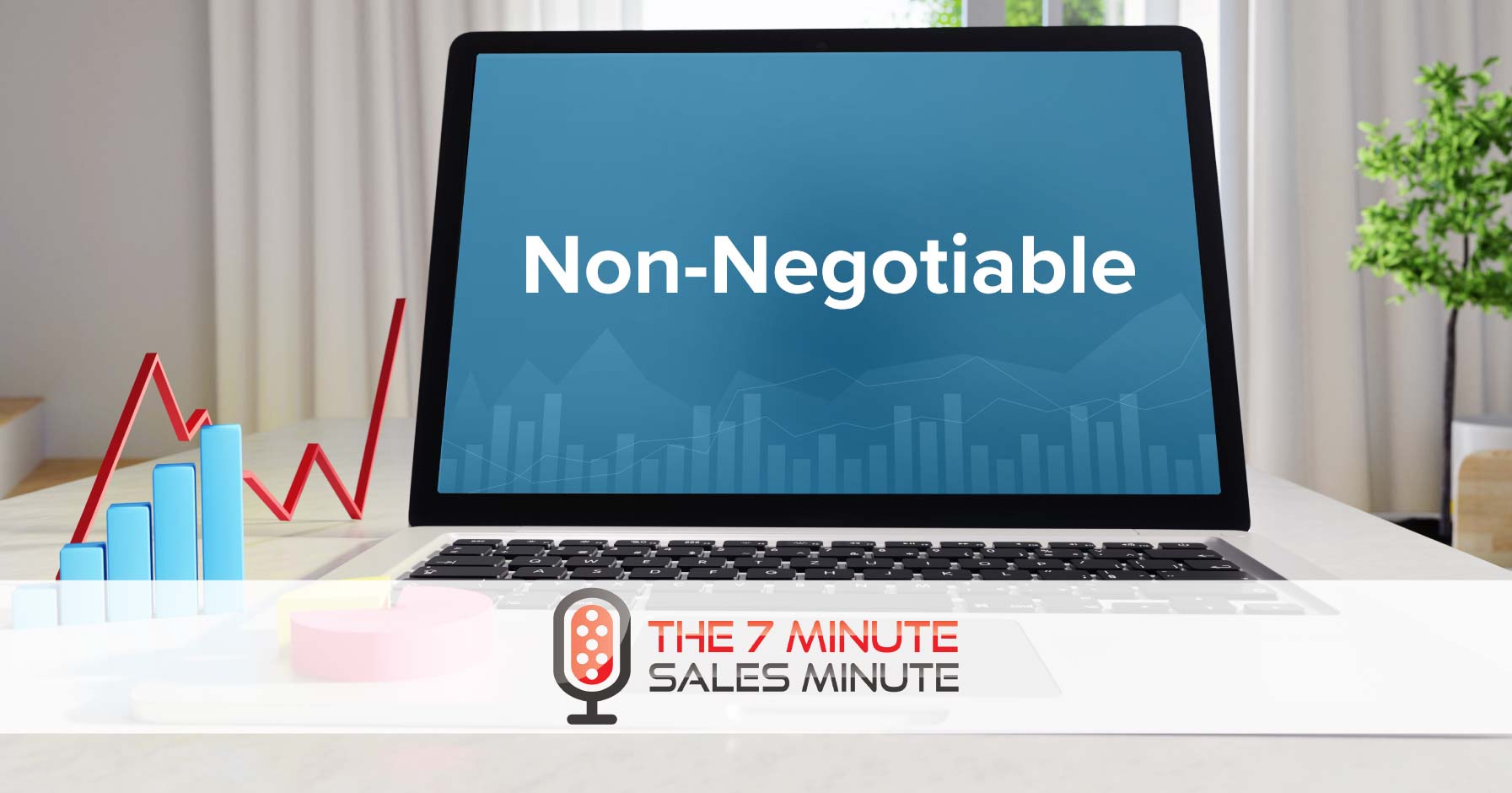
In the Season 6 finale, Scott and Jon go off on prioritizing your day for maximum effect.
Your time is finite, so make it count!
Focus on business, not busyness.
Read the full transcript
Scott Fishman: I’m Scott Fishman.
Jon Dwoskin: I’m Jon Dwoskin.
Scott Fishman: And this is the Seven Minute Sales Minute.
Jon Dwoskin: Welcome, everybody.
Scott Fishman: Hey, Jon, what’s going on?
Jon Dwoskin: Scottie, how are you? Good afternoon.
Scott Fishman: I’m doing great, man. Hey, this is for the community out there, of listeners, we’re laughing, because this is legitimately the fourth time we’ve recorded this. We actually got a great take this morning and we had some technical difficulties and then we pooped about a little bit a couple of times here, just having giggle fits, so … How’s everyone doing out there?
Jon Dwoskin: I hope everybody’s doing well, and this is a good example of things happen, technical difficulties. You just kind of try to pick it up.
Scott Fishman: Exactly. So, what are we going to try to talk about today, Jon?
Jon Dwoskin: Well, I think we’re going to talk about priorities and, well, we’re trying to talk about priorities and discipline. So, the importance of taking everything you’ve got to do in a day, taking all the clutter and prioritizing it to the top three things you’ve got to do and picking one thing at a time and doing it. And focusing and zoning in on that so you don’t get lost in the minutiae – stuck and frozen.
Scott Fishman: Yes. We’ve talked about it before, folks. It’s working on your business, not working in your business so much. We’ve all been there. We get to that point where we’re at our desk and something comes in and we feel like it’s urgent and we totally sidetrack ourselves from the important things, and we hit the end of a day and we haven’t done the business that we actually need to do. We haven’t gained any new clients because we’ve actually been stuck just on this treadmill of answering e-mail, answering voice mail, answering another e-mail, dealing with a client in process, that sort of thing, rather than cultivating new business. We want to work with you to give you ways that we can actually help you prioritize your day.
Jon Dwoskin: And one of the things I want to say is, I think, number one, the important mindset of stop doing the easy stuff. A lot of times, it’s the difficult stuff or the more challenging stuff or the stuff that takes a little bit more time, like prospecting, like dealing with current clients and potential issues or moving the bulk around those issues, asking for referrals. They take more energy, they take more time, they take more discipline to do. So I think sometimes it’s a lot easier to say, “I got all this to do, but this is all the easy stuff”. Don’t do the easy stuff. Do the hard stuff, that’s going to move your business forward.
Scott Fishman: Right. Don’t be busy just for busy’s sake. It’s definitely something that I’ve always said and you know: do business, not busyness. That’s in a lot of those.
Jon Dwoskin: That’s tweetable, what you just said, because I think most people like to pretend they’re busy, but are not busy doing the right things. So what was that quote you said? It was great.
Scott Fishman: Do business, not busyness.
Jon Dwoskin: It’s good. I’m going to write a book on that, with that title.
Scott Fishman: #bu.
Jon Dwoskin: That’s great. So, focus on that. I think that the epiphany, for many of you who are listening are going to say, “That makes sense to me, because I spend my morning pretending that I’m busy and I’m not.”
Scott Fishman: Right. So, what I do: I’m just going to kind of give an example of what I’ve done over the years and how I’ve created the way I prioritize and I think you do something similar. What I do is I end my day by looking back at my day, I journal a little bit and note what I need to get done tomorrow. What do I need to be? And I give myself three things that I need to work on. Three big rocks that I’m going to work on throughout the day.
And then in the morning, I get an early start and I revisit those and I take a look and I prioritize. I say, “Okay, here’s number one, here’s number two, number three.” And I make sure that they’re large on my sheet of paper. I start with a blank sheet of paper every morning. I make sure that they are large and in charge on that sheet of paper and then anything else that comes in throughout my day will go on my list of things to do, but I make them smaller. And if they’re smaller, they’re not urgent. They’re important, but they’re not urgent.
So I deal with the urgent things first, which would be returning a call from a client from yesterday that I’m going to create a loan for today. It’s going to be prospecting, it’s going to be finding referrals, it’s going to be anything that’s super important that needs to get done and is urgent first thing. Doing what pays me first and then everything else I can check off after.
Jon Dwoskin: I love it. And what’s your check off system? How do you check things off?
Scott Fishman: I mean, it’s so stupidly simple. I do a dash next to each to do, and then as I check it off, I turn it into a plus. Because if I cross it off my list, then I find that sometimes I can’t read what the hell I wrote, so I keep it off to the side. So, that way, it’s always going to be there.
Jon Dwoskin: I got it. So, I’m going to share what I do, too, because it is very similar. When I was 18 years old, my dad signed me up for a Franklin Covey class and taught me time management and priorities. Really just drove it home. And one of the things that they talk about is prioritizing things as an A-1 priority or a B-1 priority. And so, I have a journal, where I write down all my three top priorities that are typically anchored in what I want to grow my business forward that day and what those activities are. I’m pretty specific and measurable about the three leading activities that I do every day.
All the other to-dos, if they’re also really urgent, I’ll take the urgent ones and then I put it in my calendar so it’s always in front of me and I can get to things in between meetings. And then everything else, that’s not a top, top priority goes in an app I use called “todolist”, and it’s a great app that you can put your to-dos in and then I know I also have a place for all my low-priority to-dos. And it doesn’t really matter if I get to them today or tomorrow, but they’re important and if I have time, I have always a place to go to do more things.
Scott Fishman: I like it, Jon. You’re pretty thorough on that. I like todolist too. It’s a great app.
Jon Dwoskin: Yeah.
Scott Fishman: So here is one of the things that I’ve found over the years that actually has helped me quite a bit. I am addicted to e-mail and voicemail. Like, if I see that red light on my phone, I’m freaking out. I start to sweat if I don’t answer it within 10 minutes. So I have turned my e-mail off. At certain times of the day, Outlook is just closed.
Jon Dwoskin: On your phone?
Scott Fishman: I will. On my computer –
Jon Dwoskin: On your computer, yeah.
Scott Fishman: I’m sitting at my desk all day. So I turn Outlook off, so that way I don’t get any alerts, “Hey, a new e-mail. Hey, a new e-mail,” because those are all distracting things, when most of the e-mails that you get, believe it or not, aren’t that important. It’s a lot of updates about things about the business. It could be spam. It could be clients just asking, “Hey, can I get an update?” Something very simple that is not a hair on fire thing. So by batching it, people will still get a timely response, if you respond two or three hours later, but you’re not forcing yourself to be in that part of the business all day long.
Jon Dwoskin: And think about how much time you save by doing that. I think it’s a really important piece: how much more focused you are when you’re actually talking to the clients or you can even be that much sharper versus overly multi-tasking when you’re trying to do something – specifically, when talking to a client.
Scott Fishman: Right. And we’ve all been this person, and we’ve all had this happen to us, where we’re having a conversation and we start to trail off. And people can tell when you’re distracted. And that’s one of my pet peeves. If I’m having a conversation with you over the phone and I can tell that you’re not paying attention, you’re reading an e-mail or you’re doing something else, unless you’re driving, that’s okay. You know, I’d rather you focus on the road and I’m secondary. But, any other time, if you are not paying at least 95% of your attention to me, I’m going nuts.
Actually, from time to time, I will call people out if it’s really bad. I will actually say, “It sounds like I’m distracting you from doing something. Why don’t we pick up this conversation later?” And every once in a while you get kind of a salty response back. But, you know what? You weren’t giving me the respect as it was, so I feel like I respectfully gave you the opportunity to bow out of this conversation.
Jon Dwoskin: Yeah, well, that’s mine too. That’s understanding that you want to do business with clients who treat you with respect and vice versa, and they want to do business with you. That’s really important.
Let’s talk about just top three priorities and how you pick what those top three priorities are. You know, this is geared toward sales people, but what are those top three priorities and how do we figure out what those are?
Scott Fishman: Right. Well, basically you look at what your vision is for the day, the week, the month, the year, and you reverse-engineer it. You work backwards. If I need to hit this goal, what do I need to do to get there? And it’s not like you actually just, in my business, you don’t just give a loan. You have to do things to get there. In other businesses, you don’t just sell a window. You don’t just sell a car. There’s things that you have to do in order to get from Point A to Point B. So you need to reverse-engineer how many people do you need to talk to in order to make one car sale? How does that work? So you have to figure out how to have that many conversations. What does it take to have that many conversations? I have to now prospect in this way.
So we look at the things that it takes and those are our priorities. Those are our big rocks for the day.
Jon Dwoskin: So, I’ve got some good news and some bad news about what you just talked about. The good news is that you’re one billion percent right. The bad news is that it forces you to be held extremely accountable to exactly what you need to do to be successful. And if you don’t do it, you have nobody to blame but yourself. And we’ve talked about in past episodes, about holding yourself accountable and we’ve talked about having an accountability partner, but when you know exactly what you need to do, then setting your top three priorities and understanding what you need to do every day is much easier, because it’s plugged into the common result and goal that you want to hit.
Scott Fishman: That makes sense. I actually had a conversation – believe it or not, while I was driving around to my million stores today – with a gentleman I work with, who shall remain nameless, because he was almost embarrassed to share this with me. He said that he had a conversation with someone that we work with that asked him, “How are you finding so much success?”, and he’s like, “I’m going to be honest. I’m going to share what I’m doing with you, but I know you’re not going to do it.” And I laughed, because I’m like, “Yeah, that guy’s never going to do that.” But it’s true. You have to actually do it. We can give you all the ingredients in the world, but if you never put the cake in the oven, you’re just going to have eggs and flour.
Jon Dwoskin: You know, I think that’s a great story to end on, because you have to execute. You have to have the drive to do it. Anybody can do it, within reason, of course. But most anybody can do it, and if you put in the discipline and your mind to it, then the only excuse you have is A, you don’t want it or B, you’re just lazy.
Scott Fishman: Ooh. I like that.
Jon Dwoskin: Yeah.
Scott Fishman: So, on that note, folks, let’s finish this podcast and let’s say thank you very much for taking the time to listen to us. Our community’s been great with all the feedback we’ve gotten recently. Again, we’ve got great stuff in store for you for the next season. You’re going to love it and we just want to say thank you for tuning in one more time. We can’t do this without you. So, thank you.
Jon Dwoskin: Yeah, thank you so much. Fish, it’s been six seasons. It’s been a blast. Excited for Season 7 – around the corner.
Scott Fishman: Yes. Thank you, everybody.
Jon Dwoskin: Thanks.




